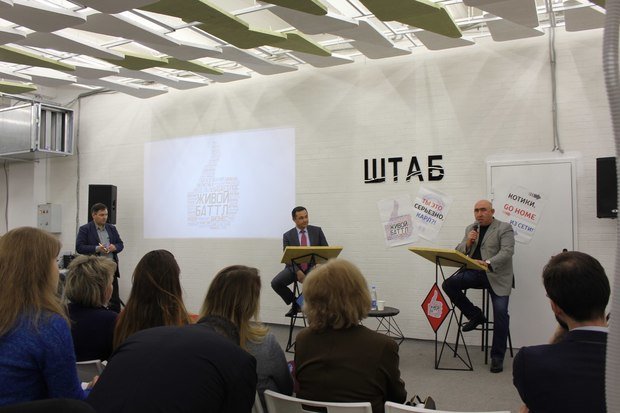''Healthcare cannot be free, it is always costly''
Representatives of private and public medicine meet in a 'battle' in Kazan
Whether there is such thing as absolutely free medicine, what part of medical services can be taken over by the private sector and who is responsible for innovations in this sphere? The head physician of the Children's Republican Clinical Hospital, Rafael Shavaliev, and the director general of the Centre of emergency medical care ('Kazan Ambulance'), Grigory Eydlin, discussed these topics in a 'battle' held in Shtab, the residence of creative industry, in the framework of the project Live Battle in Kazan. Representatives of the field, who attended the verbal duel as spectators, assessed the strength of speakers' positions.
The meeting of representatives of private and public medicine became not a 'battle' but discussion. The position of the latter was represented by the head physician of the Children's Republican Clinical Hospital, Rafael Shavaliev. In the allotted time, he described how he sees the role of public medicine — it lies in management of resources, realization of the right to life and health protection, the role of private medicine — in author's innovations and in those aid where mass approach of public medicine may be weak, plus the opportunity to provide services in a more comfortable version. But the patient will have to pay anyway.
''Free medicine does not exist, it is always costly. Medical services are paid in any case — by the budget, an insurance company or you personally to a private organization,'' the head physician of the clinical hospital cited not new but not losing relevance point and complained of the standardization, which affect the quality of the provided assistance. Effective use of resources would help to increase aid volume, but this task is better performed by private organisations so far.
Director general of the Centre for emergency medical care Grigory Eydlin decided not to make a comparison between the two sectors of medicine, calling it not quite correct.
''The budget of the Russian Federation allocated for public medicine this year — 4 trillion rubles. No commercial entity can allocate even close amount for development. It is wrong to say that someone is better and someone is worse. Only budget medicine is the future basis, hospitals can be only on the budget. No commercial structure can establish even a parody of the Children's Republican Clinical Hospital,'' began Gregory Eydlin.

Grigory Eydlin: ''Only budget medicine is the future basis, hospitals can be only on the budget. No commercial structure can establish even a parody of the Children's Republican Clinical Hospital''
He admitted that he would be happy if there was no need for private medicine.
Grigory Eydlin does not believe that private medicine is responsible for innovations, on which the head physician of the clinical hospital hastened to explain that he was not going to remove this direction from public medicine:
''Every private organisation is innovative medicine, otherwise any of you sitting here (representatives of private medical companies – editor's note) could not be successful. The state system is within the framework of calculations and cannot go beyond what has already been prescribed and regulated.''
Thus, the approbation of technologies and innovations is held in private medicine more successfully. The representative of the latter still could not agree with such statement: the key task of private companies is to provide more comfortable conditions. For example, a paid ambulance is ready to arrive quickly and in any remote area. For public medicine, due to lack of funding, lack of staff, such trip can be not quite 'a theme', as expressed by Grigory Eydlin.
At the same time, the state medicine is obliged to meet inflated requirements to the quality, there is strict oversight of all activities. Insurance companies could reduce the current tension, but their importance is understated so far, the population does not have a clear understanding of how and for what they work.
''Private medicine will win inherently. To provide high-quality medical care, it is needed resource availability, professionalism of physicians, well-functioning processes. Paid medicine has all of this,'' admitted Rafael Shavaliev.

What remains to state medicine — in addition to complaints?
The audience was more worried about the following: if private companies tell about comfort and innovations, then what remains to public medicine — except complaints?
''Most hospitals in Kazan meet the requirements, but I can tell nothing but criticism about the initial link. There are two or three good polyclinics, all the rest are at another level. Physicians have a huge number of documents, it's their job, they are no longer interested in the patient. It takes five minutes for a consultation, what nonsense is that? It takes from twenty minutes to an hour for our doctors for a consultation,'' was the claim to the system as a whole.
At the same time, as shown by the survey, the results of which were cited by battle's presenter Vladimir Sychenkov, the majority of respondents do not give preference to any of the options — paid or budget medicine, they determine their choice only by a specific doctor, on whom it all depends.
The patients do have the need for larger availability of primary care. Grigory Eydlin suggested that, if he had it his own way, he would open the offices of general practitioners on every corner.
''The future belongs to general practitioners, they may also work as private physicians, but we need a state order that would regulate it. If each yard has a point with drinking water, convenience store, and other services, why there can't be an office of general practitioner as well?'' says the director general of the Centre for emergency medical care.
Rafael Shavaliev noted that budget and commercial medicine could develop as a public-private partnership, there are projects, but they cannot be realized without a political will.